|
|
|
|
 |
|
|
|
|
| It is a matter of public record that Phillip Walker was born in Welsh, Louisiana, February 11, 1937. Phillip was the seventh of twelve children of Malvin and Viola Weber Walker, sharecroppers who were married at ages 14 and 13 and began raising a family when they were only children themselves. Malvin was a smart hardworking farmer who always managed, somehow, to keep a roof over the heads of his family. Malvin could fix anything, and Phillip seems to have followed in his dad's footsteps with a mechanical aptitude nothing short of amazing. When Phillip was 8 years old his family moved to Port Arthur, Texas. It is this combination of Louisiana Creole, French, and Indian (his mother’s mother was full-blooded Cherokee), and Texas western gunslinger that combines to prod Phillip’s unique speech patterns, accent and dialect. His mother spoke in the French Creole dialect (Cajun) of the area. |
| Things went smoothly in Port Arthur for a while, but by the time he was 12 years old, his father’s health had begun to fail and the biggest and strongest boys were expected to get the crops in. From that time, as happened in so many poor families, attendance at school became sporadic, and Phillip’s formal education was essentially finished. Phillip’s uncles, (his mother’s five brothers, including Uncle Phillip Weber), all played in bands in the 20’s and 30’s and often came around and played guitar; musicianship runs in the family. Clarence “Gatemouth” Brown is a second cousin. [For the record, Aaron “T-Bone” Walker, who also had a full-blooded Cherokee grandmother does not appear to be related to Phillip, though it has been documented otherwise in quite a few places and there is some question.] Phillip became interested in music at a young age. Not being able to afford a guitar of his own (his work in the fields earned no cash), Phillip constructed his first instrument from a cigar box, using the thinnest wire he could find (carefully and secretly removed from the family’s window screens) for strings. He had a natural ear and a God-given musical talent, and became very good quite early. He spent every spare minute, when he wasn’t working in the fields or helping herd or brand cattle, learning his instrument. He would play softly into the middle of the night, and to this day rarely sleeps more than 5 hours at a stretch. |
| If being the biggest kid didn't pay off much in being sent into the fields young, it at least enabled him (with the aid of the fake mustache his friends encouraged him to wear) to enter the local jukes, taverns and dance halls under age. So Phillip was able to sit in, from age 15, with local bluesmen and traveling musicians who showed up regularly. He continued to work in the fields all day. Phillip's first recording was made in 1952, at 17, as a sideman with Roscoe | ||
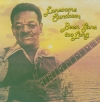 |
|
|
| Texas area. The music is rooted there and gives a special glimpse into | ||
| early influences on
all these musicians. [This recording is also a reunion
concert and, as with all Phillip's musical contributions,
is getting great reviews. As of this writing, "Boogie Rambler," featuring
Phillip's vocals and guitar, has made both the Blues and Country
"pop
charts."] It was in 1953 that Phillip met Clifton Chenier, when Chenier played a local club. It was Clifton who gave Phillip his first genuine, bona fide guitar and, against his father’s (maybe not so much) better judgment, took Phillip on the road. Phillip toured with Clifton and his band, recording with Clifton (on the Specialty, Chess & Argo Labels) and as part of an R&B package (which included performers such as Lloyd Price, Etta James, Lowell Fulson, Jimmy Reed, Little Richard, and others) and he toured the south working theatre dates, clubs and concert halls, continuing to make a living with his music whenever, wherever he could. Phillip has essentially been on the road ever since...almost 50 years! (Photo Courtesy of Da Capo Press) |
 |
| When Phillip had left home, with Clifton, at 16, his father thought it was a mistake and told him so, calling the guitar “a starvation box.” It wasn't until many years later, in a softer moment, that the elder Walker admitted that perhaps his son’s mastery of his instrument indicated a true gift and love of music, and was a testament to persistence and perseverance, when he said: “I guess you do alright with that thing (thang), son.” This was surely an understatement, according to Phillip’s many fans worldwide. |
| Phillip had first been out to California in 1953, at 16. Traveling all over the South, for years, had meant that Phillip suffered from chronic sinus infections. He had liked the weather in the Los Angeles area because his sinus problems seemed to disappear. (Remember, Los Angeles, in the early to mid-fifties was very different from Los Angeles in the year 2000). The air was clean, the coast was gorgeous, and there were the mountains, the movie stars, the glamour, the sunshine. It seemed like a paradise to a person brought up in the overbearing moisture-laden, spore-producing climate of the Gulf Coast area and inland. He stored all this information in the back of his mind, to draw on later. |
| In 1954 Phillip was in
the San Francisco Bay Area with Clift and the band when a
fight broke out which resulted in a
“disbanding” and left Clifton and Phillip
(accordion and guitar) to play the rest of the dates as a
duet. They did, and he learned the time-honored
musicians’ motto; “the show must go on”.
By 1955 he was a veteran sideman, and had played behind Little Richard, Etta James, and many others. Striking out
on his own, he formed the Blue Eagles Band, to tour with Fats Domino/Little
Richard big 10 package, in 1955, and did shows across the
United States for the next few years.
|
| (Photos Courtesy Sheldon Harris, "Blues Who's Who," Da Capo Press) | |||||||||||||||||||
|
|
|
|
|
|||||||||||||||
| Little Richard | Fats Domino | Phillip Walker | Lowell Fulson | Percy Mayfield | |||||||||||||||
| There was work at the Black & Tan Bar, El Paso, Texas in 1957 and The Lobby Inn, Juarez, Mexico. In 1958 he worked clubs in Farmington, New Mexico, Arizona, Chicago, Ohio and as far Northeast as the Apollo Theater in New York City (and recorded on the Elko label). He decided to move out to the West Coast, and relocated there for good in 1959. Phillip teamed up with Ina Beatrice Gilkey known as “Bea Bopp,” and they worked the Perkins Club and |
 |
others in the Los Angeles area. Ina Beatrice was a talented songwriter who sang but did not play any instrument. Phillip backed her on his guitar. Phil and Bea Bopp collaborated on a number of songs, some of which they recorded on the Gilkey (Ina Beatrice’s maiden American-Indian name) label. In 1963, Phillip married Ina Beatrice and they worked local Los Angeles clubs regularly as the “Phil & Bea Bopp” Show. Phillip also recorded on the AMC label in Los Angeles in 1963. Phillip frequently recorded as sideman for Model T. Slim (Elmond Mickel), Eddie Taylor, Teddy Reynolds and others through the 60's. |
| Phillip was among the first of a long line of Texas bluesmen to relocate to the West Coast in the 1950’s. Sonny Rhodes says, in an interview in “Meeting the Blues,” a book by Alan Govenar: “In 1963 there were several Texas bluesmen in California: Johnny Guitar Watson, Lowell Fulson, and Phillip Walker, who was originally from Louisiana, but was raised in Texas. I’d say there were probably at least thirty or forty blues musicians from Texas out here (by 1965). I came to California because I thought there were better opportunities for....bluesmen.” Work in Texas was beginning to decline, but Phillip still managed to |  |
| Etta James |
| get gigs there, and toured for several years
in LA, Texas and points in between. By 1966
Phillip was working hard.
He had his own band, was recording (on the Vault & Joliet labels, Chicago) and was working club dates throughout Texas and Los Angeles. In 1969 he recorded with Johnny Shines & Eddie Taylor (on the Advent label out of Hollywood/Glendale, California). He frequently worked local club dates in the Los Angeles area (including the Ash Grove, Topanga Corral, & Rick’s Bar). |
 |
| Teddy Reynolds | |
| In 1973 Phillip recorded "The Bottom of The Top" (his first solo album) for Hugh Hefner’s short-lived Playboy label. Several of the | Photos Courtesy of MCA Records& Taylor Publ. |
 |
songs on the album were written by Phillip and Bea Bopp Walker. It was a wonderful album, got quite a bit of spin, good publicity, and played to critical acclaim. It was eventually reissued (on Hightone) in 1988. By now Phillip’s virtuosity on guitar had become apparent and he had attained such command of his instrument that he could play many styles of music from blues & zydeco (his roots) to Texas blues, Gospel, Rhythm and |
| Blues, Jazz, and the Pop music of the era. He could also play piano and | |
| harmonica. His reputation spread and he toured the college circuit working concert dates. | |
| In 1974 Phillip worked the San Diego University Folk Festival (recorded live on KPFK -FM radio). He regularly worked the Palace Club and the NCO Club at El Toro Marine Air Base in Los Angeles. In 1973-4 Phillip appeared on Atomic Mama’s Wang Dang Doodle Blues Show on WNIB-FM out of Chicago. His name appeared in issues of both Britain’s “Blues Unlimited” magazine, and the well-respected “Living Blues” magazine published at the University of Mississippi by the Institute for the Study of Southern Culture. Phillip recorded "Someday You'll Have These Blues" on the Joliet label, (later reissued on Hightone) in 1976. | |
 |
This LP, too, got great press and he had established himself as a reigning blues guitarist and vocalist. Phillip had begun his career as a sideman, playing only his instrument. In the days with Bea Bopp, he both played and sang. He has an appealing tenor voice, similar in range to that of Ray Charles. It is complemented nicely by a horn section, and Phillip usually arranges the horn parts, and often travels with a horn section, (unusual for a quintet). |
| His backup preference, while not always practical for touring, is a seven-piece band; voice and guitar (himself), drums, bass, keyboard, trumpet, tenor saxophone and trombone. | |
|
|||
| By 1977 Ina Beatrice “Bea Bopp” was no longer performing in the clubs and was singing mostly gospel music for her local congregation. She was still composing good songs for Phillip to perform. Phillip was doing engagements with his band which included Dennis Walker (no relation), a bass player and a talented songwriter. Dennis wrote “Don’t Be Afraid Of The Dark," a title that produced a hit for one of Phillip's students, Robert Cray. Phillip eventually recorded it on his 1987 “Blues” Album, (Hightone label). Phillip also has songwriter and co-writer credits from this era, including the title cut from his “Someday You’ll Have These Blues” album and “If We Can Find It,” written with Ina Beatrice. | |||
| In 1976-77 Phillip worked the Bluebird and Smilin’ Faces clubs in Santa Barbara, and was invited to play the Eugene Blues Festival in Oregon. He also played the second annual (1976) San Francisco Blues Festival, held in McLaren Park in the southern-most part of the city (subsequently moved to Golden Gate Park and recently downtown San Francisco as well) The San Francisco Festival has become the longest running and most prestigious, with Tom Mazzolini, (its organizer and well-known director of KPFA radio station in Berkeley) recently being nominated to the Blues Hall of Fame in Memphis. At that time Roy Greenberg of Living Blues Magazine, Sept./Oct 1977, wrote of Phillip: “...one of the most versatile figures on the Los Angeles Rhythm & Blues circuit”. | |||
| By 1977 the Europeans (who have appeared, to many American Blues and Jazz performers, to hold America’s treasures in higher regard than America itself does) had taken notice. And so began Phillip Walker’s tours of the continent and the world. He had become a well-respected international star, while enjoying a somewhat understated success at home in America. It’s a familiar story in the world of blues. |
| In 1978 Phillip recorded on Smoke Records (Oakland) as part of a compilation of blues artists who had performed at the San Francisco Blues Festival. (Phillip again played the S.F. Blues Festival, at Fort Mason, Sept 18, 1999, as part of the Lonestar Shootout Production by Alligator records). In spite of the fact that Smoke was the twelfth label which had recorded Phillip’s music (either as a sideman or headliner) he had yet to enjoy any lasting recognition from these efforts and was spending most of his time touring (Europe, primarily, and the United States as well). |
| In the late 70's, with the exception of a few dedicated blues lovers (like Tom Mazzolini, Bruce Bromberg, Eric Clapton and others in the UK), the popularity and appreciation of Blues had dwindled on many fronts, being supplanted in many cases with a younger generation’s identification with other styles of music. Young blacks were spending their money on Soul, R & B, (all blues-influenced, of course) and young whites were buying Disco, Rock & Roll, and Country Western (also blues- influenced). And quite a few bluesmen were into Jazz. Phillip Walker was no exception and “tried his hand” performing music in a number of styles in an effort to secure a living along the way, and stay in music. But 1977 through 1980 found Phillip Walker most often, in Europe, or playing for his local congregation in South Central Los Angeles. In fact, there were several years where he was on the road close to 80% of the year. Tough on family life...if only bluesmen could afford stock in AT&T...Those phone bills home. |
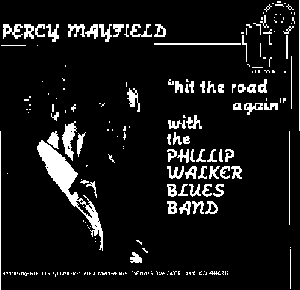 |
In 1982 Phillip recorded as a sideman for Percy Mayfield (deceased), backing up with guitar and vocals, on the Timeless LP “Hit The Road Again.” Hollis Gillmore, Lou Mathews, Ed Ahern and Dennis Walker played too. He also played 4 cuts with his band behind gospel singer Ted Hawkins on the “ Watch Your Step” album (Rounder Records). Evidently Rounder took note of a commodity in Phillip, and just a yearlater recorded his album: "Tough As I Want To Be," still available |
| Hit The Road Again | today on tape. As always the reviews were excellent and |
| airplay led to bookings. It was about this time that | 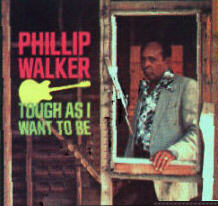 |
|
| Phillip hooked up with Tom Radai dba "Blues Management" out of Milwaukee, Wisconsin (a blues guitarist himself who, following his love of the music, was doing booking for authentic bluesmen). Theirs has been a longtime friendship and they have done business since on just a handshake. After having dealt with | ||
| so many broken promises (and outright swindling in some instances) in the | ||
| recording industry, Phillip found it refreshing to work with someone he believed he could trust, and has remained loyal to Tom even when the going got tough. And it did. "It Ain't Nothin' but the Blues." | ||
 |
By 1986 Phillip was planning to retire from touring (he would be 50 and had been “on the road” for 35 years). A retirement/birthday bash was planned. But personal tragedy struck (in the death of his only son, Angelo) and his wife’s health had begun to fail. Bruce Bromberg wanted to record Phillip on Hightone Records (Oakland) and the retirement plans went out the window. Surely, he felt, "Blues" would be his last album. With able sidemen including The Memphis Horns he cut a poignant and very |
| emotional body of songs, among his finest work to date. Ina Beatrice "Bea Bopp" Walker | |
| eventually succumbed to lung cancer (she had never smoked) and | |
| passed away in 1991. Phillip was
distraught, but continued to tour to pay the bills. He was quoted as
recently as February 1997, in a lengthy and thorough
article in Living Blues Magazine written by John Anthony
Brisbin, as saying that Ina Beatrice Walker continued to this day to
be his inspiration. Most of his albums and
CDs give her special thanks in the liner notes.
JSP Records in Great Britain, where Phillip enjoys quite a following, recorded a collaborative effort in 1992 between Phillip Walker and |
 |
| Otis Grand and produced "Big Blues From Texas." | "Bea Bopp" & PW 1978 |
.jpg) |
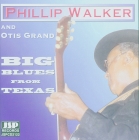 |
|
| This recording was not readily available in the | ||
| states but did quite well abroad and was reissued | ||
| with new cover art in 1999. | ||
| In 1994 Phillip was approached when he was | ||
| performing at the House of Blues in New Orleans | ||
| by the owners of Black Top Records, the Scott | ||
|
Cover 1992 Release |
NEW Cover, 1999 Re-Release |
brothers, to do some recording for them. It |
|
appeared a good idea, since Black Top had |
||
| Rounder records as their distributor, and so Phillip recorded another CD, this time for Black Top. The recording, "Working Girl Blues" got good reviews and quite a bit of early airplay, | ||
| but the hand of fate reached out again and at the height of airplay, fans could not secure copies of the CD because Black Top and Rounder were involved in some sort of financial dispute that grossly affected the distribution of Phillip’s latest recording (and the works of eight other blues artists). Evidently the dispute had all but bankrupted Black Top, and the second album he had recorded to honor his contract with them was not released within the contracted schedule due to their financial constraints. It's the blues, it's been tough. Some of the lean | 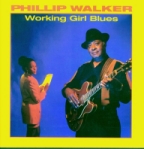 |
| years might have driven a lesser person right out of the music business and into the mechanic | |
| business. But luckily for us, Walker persevered. Luckily for Phillip and | |
 |
his fans, Alligator
records eventually picked up the ball and bailed Blacktop out.
Phillip's CD, "I
Got A Sweet Tooth" was finally released by Blacktop in 1998, a
very lean year late. There was talk of re-releasing
"Working Girl Blues" to give it the fair shake
it deserved.
Besides the re-release of his "Big Blues from Texas" album (JSP, 1992) in 1999 with the new cover, Mr. Walker's most recent release has been |
| on Alligator Records. Entitled "Lonestar Shootout," it is supposedly a | |
| "duel" of the guitar and vocal work of 4 long-time rivals, all hailing from the Louisiana-East Texas bayou country. | |
| Actually, sharing the bond of a combined almost two hundred years of knowledge of being "on the road" and in the music business, the camaraderie is evident. This recording contains quite a few songs with artists Lonnie Brooks, Long John Hunter, and Ervin Charles. There are four cuts featuring Phillip's vocals and guitar (he backs the other men on the rest), two of | 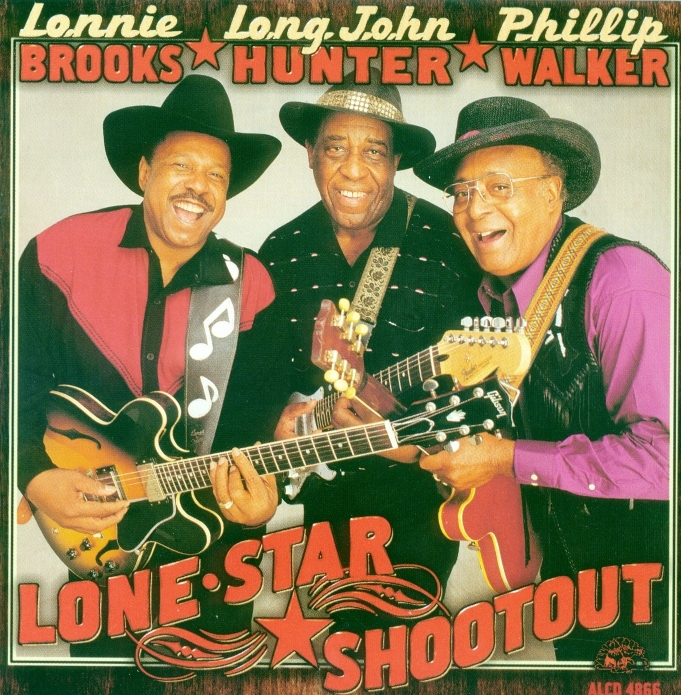 |
which have made the POP charts. "Boogie Rambler" is an infectious up tempo cover of a tune from the fifties that Phillip felt had not gotten proper attention when it was originally released. Guess he was right. He brought some life to the song (it does seems autobiographical) and it's getting some attention now. |
| Lonestar Shootout | ||
| And all the while, the tours continue. Phillip Walker has played every major festival in the world, headlining most. He played Utrecht, Holland in November, 1997 and a festival in Tokyo, Japan in December, 1998. This year Walker was booked to play the Washington DC Blues Festival, with the Lonestar Shootout production, but was rained out. He played the prestigious "King Biscuit Blues Festival" with the Phillip Walker Blues Band in October, 1999, and a number of special series engagements at the Six Flags chain of amusement parks (definitely party time). | ||
| Phillip Walker has toured in Australia, and all over Europe many times. Though international air travel and lodging are most expensive during the months when the weather is good and outdoor festivals are usually scheduled, plans are being formalized now to tour Europe again, in the summer of 2000. In 1999 he traveled to Scotland and England, and all over the United States and Canada. When he is touring, Mr. Walker’s touring schedule can be found at the Alligator Records website. | ||
| Many of his fans travel hundreds of miles to hear Phillip play and sing. His performances are electrifying, and by the end of the night you will find yourself dancing if you never have before. Blues is a feeling, blues is a format. Blues can be repetitive, blues can make you sad. But here is a genuine-article, real-deal bluesman who doesn’t think having the blues means that you have to cry in your beer. Phillip Walker is a positive guy. “If life hands you lemons, make lemonade.” When things get really funky, it’s probably time to let off some steam. Time to DANCE! And his music will make you do just that. With all its diverse influences, Phillip Walker’s music can’t be categorized any better today than it could 45 years ago when he started. Oh, it’s blues, alright, but why does it feel like an antidote to the blues? |
| Phillip Walker has traveled to many countries for club dates, concerts and festivals, and has even played in small towns, ushered there by local devotees who have plastered his face all over town on big posters and are thrilled |
|
||
| by his arrival. It's party. People have fun. They dance and make merry. England, Denmark, Switzerland, | |||
| Germany, the Netherlands, Italy, Scotland, Spain, France, Belgium, Finland, Ireland, Australia, Austria, Iceland, Sweden, Norway, and Japan: | |||
| that's a lot of territory for a humble guy |
(Photo courtesy of Angela Bordush, Canada) |
||
| the bayou country. Mr. Walker also enjoys | |||
| big fan bases in Brazil, Greece and New Zealand and is currently making arrangements to travel to these countries, too. He can usually be found traveling with his own band, The PHILLIP WALKER BLUES BAND, but he has played with "backup bands" of musicians from all over the world. | |||
| Musically, Mr. Walker is an innovator. He breaks the rules. He makes it work. And what he brings to the places he goes is an All-American zest for life, evident at all times in his "up close and personal" music. Phillip seems to also contradict the rules in that his live performances are every bit as good as his recordings, if not better! Infused by the energy of the crowds he draws, he and his band create an environment with their music where people just can't help getting up and dancing their blues away. When questioned by the blues traditionalists as to how his music can be called "blues," Walker most often responds: "Why not?" |
| Phillip Walker has taught music (guitar and voice) and has educated many band members and others both musically and in the procedures of recording and publishing material, copyrights, etc. The successes of those he has tutored speaks well for his patience, knowledge and abilities to teach and inspire. Phillip spends much of his time on tour, rehearsing his band, learning new material, writing songs, doing radio, television and magazine interviews and keeping his family commitments as great-grandpa to many. He also has the ongoing project of personally maintaining his “bluesmobile” (Miss Lula Bee) doing all the mechanical work himself (he is considered a mechanical genius by those who know him). One might wonder where he finds the time to write and arrange material. He says, in response to this question, “Well, you know, I just kind of hear it in my head, and it’s already written, and all arranged and everything.” All you can do is shake your head, tap your foot, and say, “What a guy!” |
|
|
 |
|
 |
||
| PHILLIP WALKER | ||
| & the | ||
| Phillip Walker | ||
| Blues Band | ||
Home/~ Discography/~ Reviews /~ Pearls /~ Links /~ Fan Club /~ Photos /~ Bookings /~ Send Email |
Biographer: bookin@bluesbook.com 1999